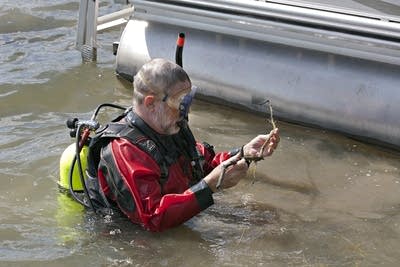Pesticide treatment on zebra mussels may work in one northern lake
Go Deeper.
Create an account or log in to save stories.
Like this?
Thanks for liking this story! We have added it to a list of your favorite stories.

An experimental effort to stop the spread of zebra mussels in a northern Minnesota lake might be working, according to the state Department of Natural Resources.
This week, divers searched for zebra mussels in a small lake in Otter Tail County. Last fall, a small area of the lake was treated with chemicals to kill the invasive aquatic species.
DNR Research Scientist Gary Montz is one of two divers searching a small area at a resort on Rose Lake. Clad in scuba gear, he scans the underside of a dock looking for zebra mussels.
Zebra mussels likely arrived at Rose Lake last summer on a boat lift that came from a nearby lake that was already infested. A few weeks later, a local resident noticed the invasive species and contacted the DNR.
Turn Up Your Support
MPR News helps you turn down the noise and build shared understanding. Turn up your support for this public resource and keep trusted journalism accessible to all.
Because the infestation was new and appeared to be confined to a small area, the DNR decided to treat the area with a pesticide last fall.
This case is a unique situation where the zebra mussels were found quickly, and hopefully before they spread, said DNR Invasive Species Specialist Nathan Olson.
"We're hoping we don't see any zebra mussels, is what we're hoping today. That's just going to be another step in the right direction for us," Olson said. "We haven't seen any baby zebra mussels in any of our water samples yet this summer."
"It's a positive sign but we still need to monitor the lake down the line."
A Fargo man was charged with transferring the zebra mussels to Rose Lake. Earlier this year he paid $1,000 in fines and restitution.
The DNR also used pesticide on a lake in Douglas County where zebra mussels were brought in on a piece of equipment. A man charged in that case is set to go to trial next week.
A new law requires any equipment taken from a lake to dry for 21 days before it can be moved to another lake.
The DNR divers emerge from the lake after a couple of hours. They found no zebra mussels. But that doesn't mean they aren't out there, Montz said.
"It's really difficult because you're looking for something that may only be a half-inch long. We didn't find any," Montz said. "It's a positive sign but we still need to monitor the lake down the line."
Montz says even if the pesticide treatment successfully stops the zebra mussel infestation at Rose Lake, that doesn't mean the treatment would work on other lakes. Rose Lake is unique because the zebra mussels were discovered soon after they were introduced to the lake.
Olson is pleased the divers found no zebra mussels, but he's not ready to call this experiment a success.
"From my experience with zebra mussels, they seem to have a really big increase in about two years,once they're found in a lake," Olson said. "If I don't see any zebra mussels for about two years, then I'm going to be more excited about our success rate."
Olson said he will return this fall to check for zebra mussels on docks and boat lifts, after residents pull the equipment out of the lake for the winter.
That's something he said all Minnesota lake residents should make part of their fall routine as they close up their cabins.
Dear reader,
Political debates with family or friends can get heated. But what if there was a way to handle them better?
You can learn how to have civil political conversations with our new e-book!
Download our free e-book, Talking Sense: Have Hard Political Conversations, Better, and learn how to talk without the tension.






